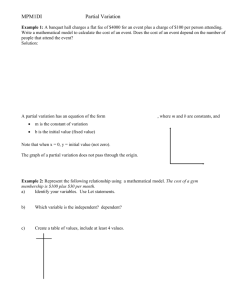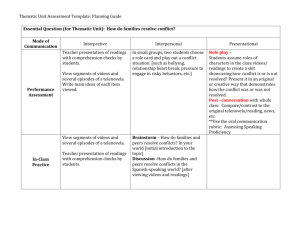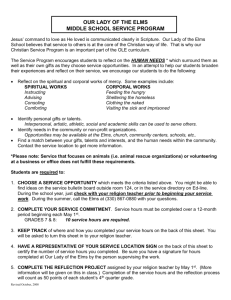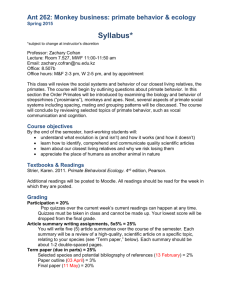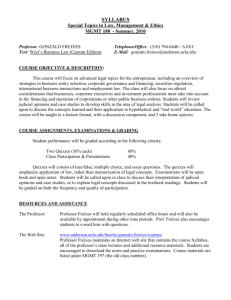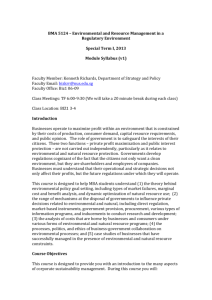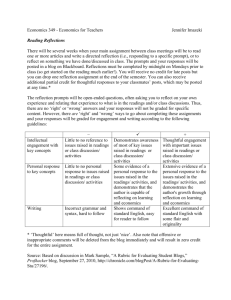Class 1 - Introduction – Review Primate Classification
advertisement
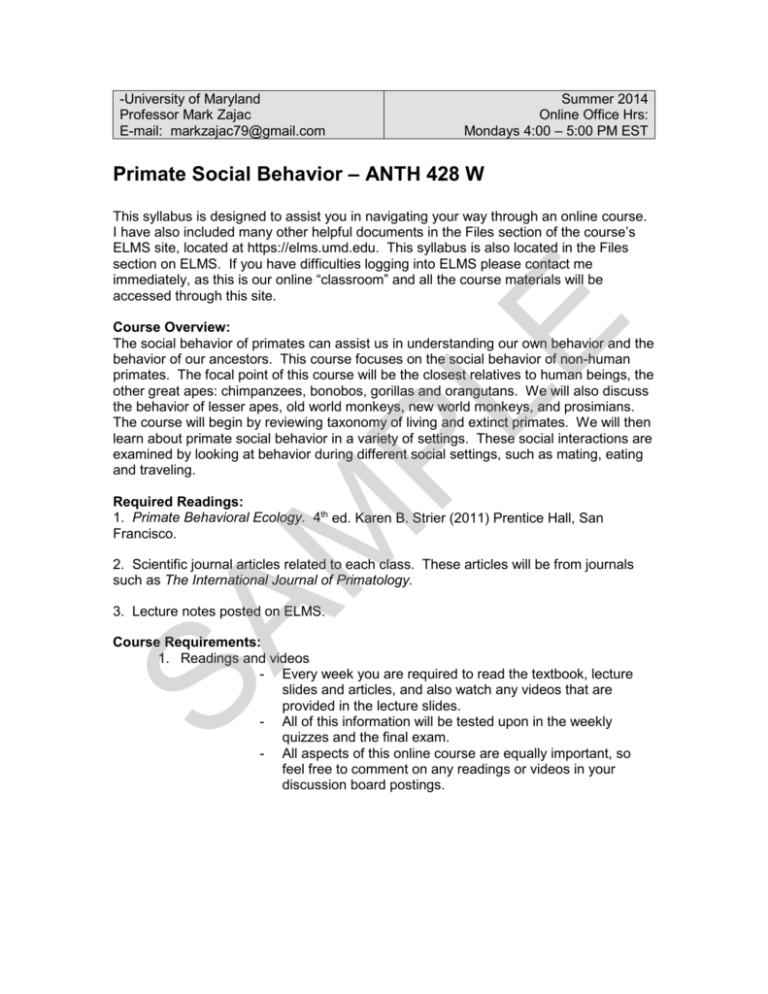
-University of Maryland Professor Mark Zajac E-mail: markzajac79@gmail.com Summer 2014 Online Office Hrs: Mondays 4:00 – 5:00 PM EST Primate Social Behavior – ANTH 428 W E This syllabus is designed to assist you in navigating your way through an online course. I have also included many other helpful documents in the Files section of the course’s ELMS site, located at https://elms.umd.edu. This syllabus is also located in the Files section on ELMS. If you have difficulties logging into ELMS please contact me immediately, as this is our online “classroom” and all the course materials will be accessed through this site. PL Course Overview: The social behavior of primates can assist us in understanding our own behavior and the behavior of our ancestors. This course focuses on the social behavior of non-human primates. The focal point of this course will be the closest relatives to human beings, the other great apes: chimpanzees, bonobos, gorillas and orangutans. We will also discuss the behavior of lesser apes, old world monkeys, new world monkeys, and prosimians. The course will begin by reviewing taxonomy of living and extinct primates. We will then learn about primate social behavior in a variety of settings. These social interactions are examined by looking at behavior during different social settings, such as mating, eating and traveling. M Required Readings: 1. Primate Behavioral Ecology. 4th ed. Karen B. Strier (2011) Prentice Hall, San Francisco. 2. Scientific journal articles related to each class. These articles will be from journals such as The International Journal of Primatology. SA 3. Lecture notes posted on ELMS. Course Requirements: 1. Readings and videos - Every week you are required to read the textbook, lecture slides and articles, and also watch any videos that are provided in the lecture slides. - All of this information will be tested upon in the weekly quizzes and the final exam. - All aspects of this online course are equally important, so feel free to comment on any readings or videos in your discussion board postings. SA M PL E 2. Online weekly quizzes - Multiple choice quizzes have to be completed online on Wednesday or Thursday of every week, except for the first and last weeks of the course. - You will have 20 minutes to complete each quiz. - Read the required material and watch the videos from the week before taking each quiz. - Quizzes will be available on the ELMS website in the Quizzes section on Wednesday and Thursday. Click on the quiz for the week and it should begin automatically. - If you do not complete the quiz on Wednesday or Thursday, you will receive a zero for that week’s quiz. 3. Online discussions – Each student will lead an online discussion every week based on the lectures, videos, text readings and journal articles. Students are required to participate in weekly discussion sessions. - Based on the readings and videos for each week, students are required to submit one original post and also respond to all posts that were submitted by your classmates and your professor - These posts can be in the form of a question you had about the material, a comment on something you find interesting, something you disagreed with, etc. - The lectures slides often include questions that are meant to spur discussion, so feel free to address these topics in your posts. - Your first entry must be your original post and must be made by the end of the day on Wednesday every week. This original post must be at least three sentences in length. - Thereafter, you are required to respond to your fellow students’ and professor’s entries. You must respond to all of the entries from your classmates and professor on Thursday or Friday of the same week. These postings must be completed by Friday at midnight, Eastern Standard Time. These responses can be made in response to an original post or another response post - Response posts must also be three sentences in length. Discussion board grading criteria - All posts must be thoughtful and relevant to the topic at hand to receive the maximum points. - Therefore, in order to receive the maximum points for the discussion portion of the course you must submit your original post on Monday, Tuesday or Wednesday and your response posts to your classmates and professor on Thursday or Friday. - Specific details on how to structure questions and make postings are located in the Files section of the ELMS website. - If you write three short sentences that do not provide much information or thought, you will not receive the maximum points. I will provide weekly grades on your posts and feedback regarding how to improve your performance. 4. Final exam - - The final examination is in the form of a take-home exam. The exam will be posted on Wednesday, August 20, and is due by NOON EASTERN STANDARD TIME on Friday, August 22. You must download the exam, answer the essay questions and email them to me in Microsoft Word format. Do not download the exam one hour before it is due and expect to be able to complete it on time. No late examinations will be accepted, except under extraordinary documented medical or emergency situations. E 5. Research paper - This assignment will be posted in the Assignments section on ELMS. - This paper is due during the fifth week of class. M PL Online Etiquette: Your posts are made via the course’s ELMS site and are being read carefully by your classmates. Please proofread your posts thoroughly before submitting them. You will lose points if you have grammatical errors in your posts. Also, be respectful of your classmates when posting and responding to other posts. Rude, obnoxious and disrespectful communications will not be tolerated. Students who do not comply may be dropped from the course. Finally, if you want to post a link to a video, website, or an article that may contain questionable content, please contact me in advance for approval. SA Academic Dishonesty: Academic dishonesty including plagiarism, cheating on exam and submitting similar work to that of another classmate will result in an automatic 0/F for the assignment. Due to the fact that you will be submitting everything electronically, it will be very easy for me to catch instances of plagiarism on both the exams and research papers. I do not tolerate academic dishonesty and will catch you if you cheat. The University of Maryland, College Park has a nationally recognized Code of Academic Integrity, administered by the Student Honor Council. This Code sets standards for academic integrity at Maryland for all undergraduate and graduate students. As a student you are responsible for upholding these standards for this course. It is very important for you to be aware of the consequences of cheating, fabrication, facilitation, and plagiarism. For more information on the Code of Academic Integrity or the Student Honor Council, please visit http://www.shc.umd.edu Online lectures: Every Monday throughout the summer session, I will post the lectures for the week in the Files section on ELMS. You will need Microsoft PowerPoint to view the lecture slides. These lectures are designed to guide you through the readings as well as introduce topics and information not covered in the required readings. Reading the lectures is not a substitute for reading the other course materials as much of the material in the textbook and articles is not mentioned in the class slides. Grading Breakdown: - Online quizzes – 80 points – 20 points each with one quiz per week for every week except the first and last weeks of the course. There will be a quiz to complete in week 2, week 3, week 4 and week 5. - Final Exam – 100 points - Research paper – 50 points - Discussion participation - 100 points – 20 points per week. This is obviously a large portion of your grade. Be sure to participate every week. There are no discussion board postings due the last week of class due to the final exam. - TOTAL POINTS – 330 points Final grades will be based on the following standard grading scale: Course Grade Percentage A 90-100% B 80-89% C 70-79% D 60-69% F below 60% PL E - Summer II 2014 Online Assignment Schedule Reading and Video Assignments Dates Articles posted in the files section for this week and any videos provided in the lecture slides Primate evolution, characteristics, habitats, feeding Reading – Strier, pages 30-40, 55-70, Chapters 6 and 10 M Week 1 (Week of 7/14) Primate classification, Research methods Reading – Strier, Chapters 1 and pages 40-56 Articles posted in the files section for this week and any videos provided in the lecture slides Communication and Reproduction and Development Reading - Strier, Chapters 5, 7, 9 and 10 SA Week 2 (Week of 7/21) Week 3 (Week of 7/28) Week 4 (Week of 8/4) Articles posted in the files section for this week and any videos provided in the lecture slides Primate societies and Social Behavior, Prosimians Reading – Strier, Chapters 4 and 8, pages 269 - 277 Articles posted in the files section for this week and any videos provided in the lecture slides Week 5 (Week of 8/11) RESEARCH PAPER DUE THIS WEEK Articles posted in the files section for this week and any videos provided in the lecture slides Primate Culture, Conservation, FINAL EXAM Reading – Strier, pages 70-79, Chapters 11 and 12 Articles posted in the files section for this week and any videos provided in the lecture slides SA M PL E Week 6 (Week of 8/18) FINAL EXAM New World Monkeys, Old World Monkeys and Apes No readings from Strier for this week


